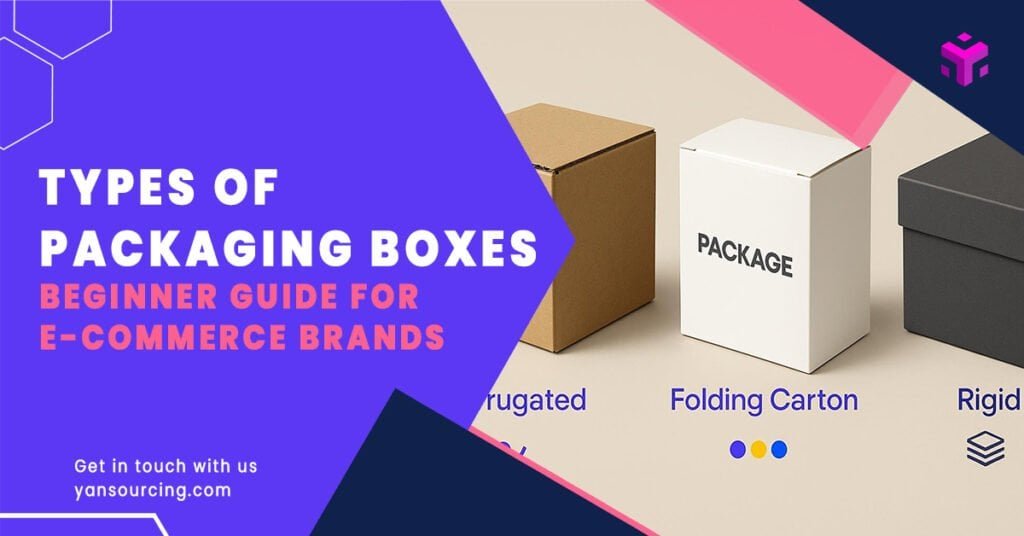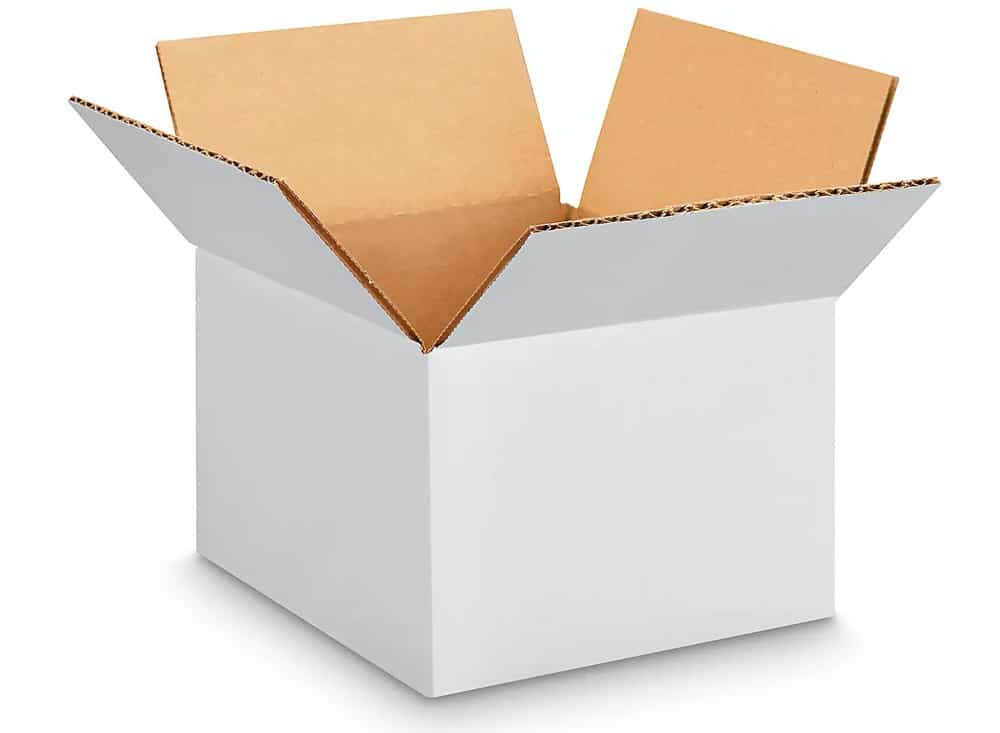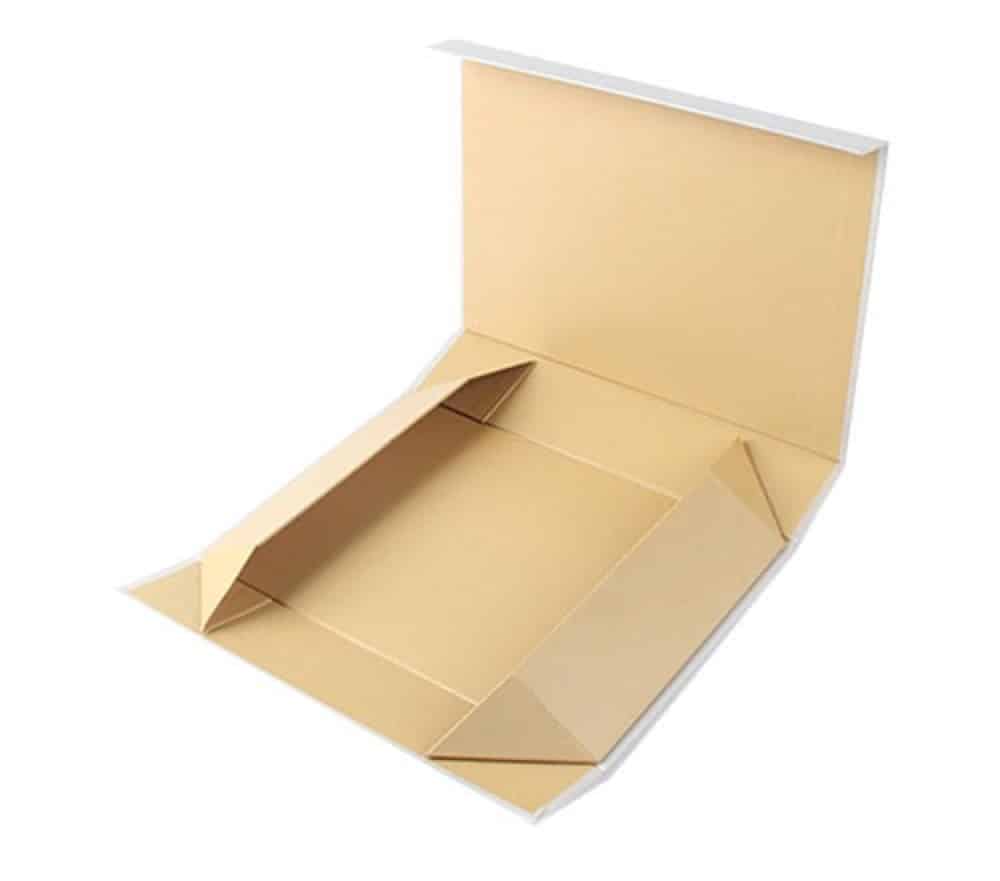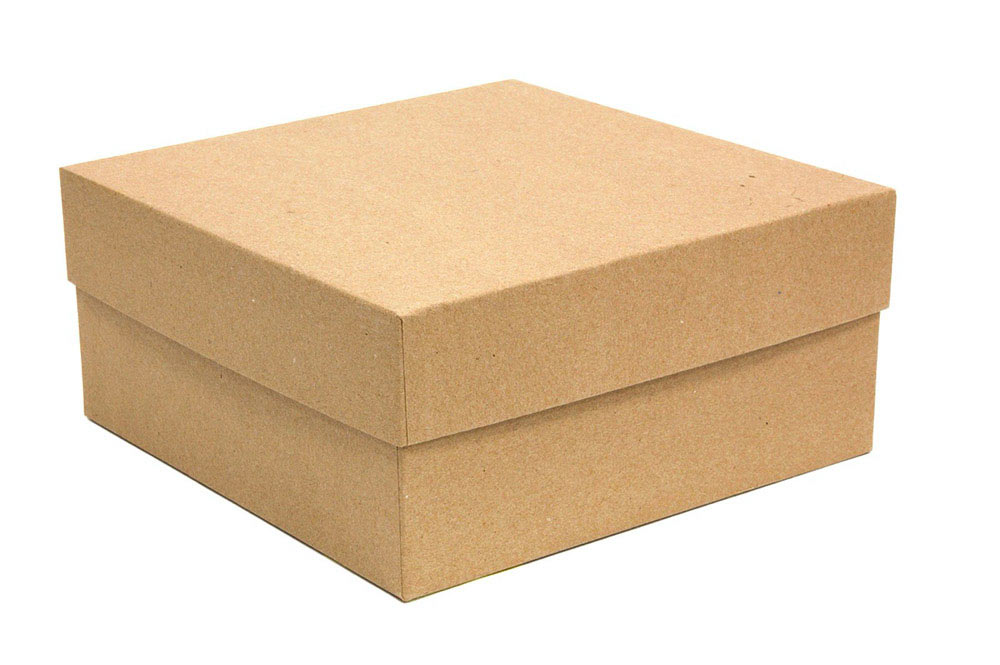
If you’ve ever said “cardboard is cardboard,” you’re not alone. The truth is, different box types behave very differently in the real world—especially for D2C shipping, Amazon FBA, and 3PL fulfillment. Choosing the right structure can cut damages, avoid DIM weight penalties, and improve margins without hurting your brand.
Don’t worry—this guide keeps things simple. By the end, you’ll be able to match your product and sales channel to the right box type and brief a supplier with confidence.
1) What “box type” really means
Think of three families:
- Corrugated boxes: The workhorse shippers and mailers. They have a wavy middle layer (flute) between flat liners, which gives strength with low weight. For a clear definition and how flutes work, see the industry explainer from the Fibre Box Association in What is Corrugated? (FBA, 2024) Fibre Box Association overview.
- Folding carton (paperboard): Sleek retail “inner” boxes for shelf presence and unboxing, but not designed for rough shipping on their own.
- Rigid (setup) boxes: Premium presentation with a thick greyboard core wrapped in printed paper—great for gifts or high-ASP products.
Inner vs. outer packaging in plain words:
- Inner packaging (often folding carton or a rigid gift box) presents and protects the product in the customer’s hands.
- Outer packaging (usually corrugated) survives carriers, sorting, and stacking.
FEFCO basics: a universal “style language” for corrugated and solid board designs. The code gives you a simple way to specify form factors to any supplier. See the official catalog (12th edition) and overview from FEFCO FEFCO ESBO code overview.
Common styles you’ll hear about:
- 0201: Regular Slotted Container (RSC) – classic shipping box with four flaps that meet in the middle.
- 0426/0427: One-piece die-cut mailers (tuck/front locking) often used for e-commerce unboxing.
- 0601: Telescope set – lid and base slide over each other (think classic shoe box form).
- 0713: Crash-lock/auto-bottom – pops open quickly with a reinforced base for faster packing.
2) Corrugated boxes (the workhorse)

When to use:
- Master cartons, parcel shippers, D2C mailers, subscription boxes, wholesale/palletized shipments.
Flutes and walls (simple view):
- E flute: Thin, neat printing, good for branded mailers.
- B flute: Balanced strength and print area; common for standard shippers.
- C flute: A bit thicker; better cushioning.
- BC double wall: Two flutes (B + C) for heavy/dense loads and better stacking.
Strength measures—ECT vs. Burst (Mullen):
- Burst strength (Mullen) measures how much pressure a board can take before it ruptures—helpful for puncture resistance. See TAPPI’s T 810 test method description (TAPPI, 2023) in the standards document TAPPI T 810 burst test.
- Edge Crush Test (ECT) gauges edgewise compression, which correlates with stacking performance for boxes. While the formal method is covered by TAPPI/ISO standards, beginners can treat ECT as the go-to spec for stacking strength.
Rules of thumb to discuss with your supplier and 3PL:
- 32 ECT single-wall: Light parcels and many small D2C shippers.
- 44 ECT single-wall: Heavier units or when cartons will be stacked higher at a 3PL.
- Double-wall (e.g., BC): For dense products or higher stacking/compression environments.
Tests and real-world handling:
- Parcel simulation: If you ship via parcel carriers, ask about ISTA Procedure 3A testing for free-fall drops, vibration, and compression in parcel systems; see the official standard description (ISTA, 2020–2024) ISTA 3A overview.
- Humidity matters: Corrugated loses compression strength with high relative humidity; industry updates highlight RH as a major driver of box compression strength loss—see FBA’s research commentary (FBA, 2022) FBA on humidity and BCT.
Printing on corrugated:
- Flexographic: Plate-based, economical for volume, crisp with 1–2 spot colors; water-based inks are common. See an accessible explainer (Flexopedia, 2024) Flexo printing in corrugated.
- Digital inkjet: No plates, great for short runs/prototyping/versions.
- Offset via litho-lamination: Offset sheet laminated to corrugated—premium graphics at higher cost/complexity.
3) Folding carton boxes (paperboard)

When to use:
- Retail presentation, cosmetics, small electronics accessories, inner packaging inside a corrugated shipper.
Materials you’ll see:
- SBS (Solid Bleached Sulfate): Bright, premium print surface for high-end categories.
- FBB (Folding Boxboard): Multi-ply, stiff and light; common in retail packaging. For a manufacturer overview with typical thickness ranges, see Metsä Board’s materials pages (Metsä Board, 2024) Folding boxboard overview.
- CCNB (Clay Coated News Back): Recycled-content, economical, decent print.
Printing and finishes:
- Offset CMYK and Pantone spot colors deliver excellent fidelity.
- Finishes: foil, emboss/deboss, spot UV, soft-touch coatings.
Important caveat:
- Folding cartons are not designed to ship by themselves via parcel carriers. Always pair with a corrugated outer if you’re sending individual orders.
4) Rigid (setup) boxes

When to use:
- Premium unboxing and gifts, high-ASP products, influencer kits.
How they’re built:
- Dense greyboard (often 2–3 mm) forms the structure, wrapped with printed/decorative paper. Common inserts include EVA/EPE foam or molded pulp. See primer-style summaries from packaging specialists like PakFactory (2024) Rigid box basics.
Trade-offs to consider:
- Higher unit cost, more labor, longer lead times than corrugated/folding carton.
- Heavier volume/weight can increase DIM charges if used as the shipping container.
5) Specialty and e-commerce-specific forms
- Die-cut corrugated mailers: Roll End Tuck Front (RETF), bookfolds, and pizza-style designs map to the FEFCO 04xx family (e.g., 0426/0427). See the FEFCO catalog for diagrams and exact codes FEFCO ESBO code overview.
- Telescope sets: Lid + base (FEFCO 0601) for a clean reveal.
- Tubes/round boxes: Paper canisters for unique form factors (usually as inner or with protective outers).
- Eco upgrades: Recycled content, FSC-certified papers, plastic-free inserts, and soy-based inks. For what FSC labels mean, see FSC’s official guide (FSC) What the FSC labels mean.
6) Inserts and product protection
Common insert choices and when to use them:
- Die-cut corrugated: Strong, recyclable, cost-effective; great for most D2C SKUs.
- Molded pulp: Good shock absorption, recyclable/compostable; mid-cost.
- EPE/EVA foam: Highest protection for fragile/precision items; less recyclable curbside.
- Honeycomb paperboard: Structural strength with recyclability.
- Paper wrap/tissue: Scratch protection only.
If you’re shipping parcels, validate the whole system (box + insert + product) with a parcel simulation like ISTA 3A ISTA 3A overview.
Toolbox: Who can help you get this right
- Yansourcing: End-to-end China packaging sourcing and coordination (specs, supplier vetting, samples, QC, 3PL/FBA compliance checks). Good when you want a 1-on-1 agent to translate your brief into factory-ready specs and manage production. Disclosure: Yansourcing is our product.
- Alibaba/Global Sources directories: Huge supplier pool if you can vet factories and specs yourself; wide range of quality and service—best when you already have packaging expertise.
- Packhelp or PakFactory: Guided online customization, friendly for lower MOQs on certain formats; per-unit cost can be higher than direct factory sourcing for scale.
- 3PL consults (e.g., ShipBob packaging guidance): Useful to align with fulfillment constraints and standardization; limited depth for custom engineering.
7) Finishes and branding trade-offs
- Color strategy: For corrugated, a kraft base with 1–2 Pantone spot colors (flexo) is a cost-effective, brand-right look. Digital suits small runs or many SKUs. Litho-lam for premium graphic coverage.
- Coverage vs. cost: Heavy, full-bleed coverage on corrugated usually costs more; consider a clean exterior with a surprising inner print moment.
- Touch and shine: Use foil, spot UV, or soft-touch only where they truly move the needle on perceived value or conversion.
8) Compliance and channel rules (FBA, 3PL, DIM, and tests)
Amazon FBA basics to keep in view:
- Labeling and prep: Follow Amazon’s official Packaging and Prep Requirements (Seller Central help hub, canonical) to ensure barcodes, suffocation warnings, and carton labels are compliant Amazon Packaging & Prep requirements.
- Shipping and routing: Check carton/pallet labeling and routing requirements before booking freight Amazon Shipping & Routing rules.
Dimensional weight (DIM):
- Carriers bill the greater of actual vs. dimensional weight. FedEx explains the formula for dimensional weight in inches/pounds using a divisor (commonly 139 in the U.S.) and the rounding rules around dimensions FedEx dimensional weight guide.
- UPS also publishes DIM calculation details and divisors in its rate guides (example: 2025 Canada guide) UPS DIM details (Rate Guide). Right-size the box to avoid paying for “air.”
ISTA parcel testing:
- For D2C parcels, request ISTA 3A tests (drops, vibration, compression, conditioning) to reduce in-transit damage and returns ISTA 3A overview.
3PL and warehouse realities:
- Stack heights and humidity vary. Corrugated compression strength declines at higher RH; plan flute/board spec and stacking accordingly, referencing industry insights (FBA, 2022) FBA on humidity and BCT.
9) Quick visual matrix: which box when?
| Box type | Best for | Protection | Typical MOQ (China) | Lead time | Cost per unit | Notes |
|---|---|---|---|---|---|---|
| Corrugated | Shippers, D2C mailers, master cartons | High for shipping | 1,000–2,000+ | ~7–20 days | $ | Choose flute (E/B/C/BC) + ECT; print flexo/digital/litho-lam |
| Folding carton | Retail inner boxes, light items | Low for shipping (needs outer) | 5,000–10,000+ | ~10–20 days | $–$$ | Offset printing; great shelf appeal; not for rough parcel by itself |
| Rigid (setup) | Premium gifting, high-ASP | Medium as inner; heavy as outer | 1,000–5,000+ | ~15–30+ days | $$–$$$ | Adds weight/volume; strong presentation ROI when justified |
Notes reflect common China manufacturing ranges; confirm MOQs/lead times per project.
10) Mini case lessons (simple and realistic)
- Lesson 1: Swapping a rigid gift box to a die-cut corrugated mailer with a molded pulp insert reduced DIM weight and breakage—overall landed cost dropped while keeping a premium feel with kraft + inner print.
- Lesson 2: Upgrading from single-wall 32 ECT to 44 ECT B-flute for a 3PL that stacks five-high cut crushed-carton returns significantly, offsetting the small per-unit cost increase.
- Lesson 3: Moving from heavy spot-UV + foil to a clean 1–2 Pantone flexo on kraft saved noticeable cost at 5,000 MOQ; budget reallocated to better inserts.
Always validate specs with your supplier and test under your actual shipping conditions.
11) Supplier briefing template (copy/paste)
Use internal dimensions unless noted otherwise.
Product and channel
- Product name + SKU:
- Unit weight + size:
- Fragility/scratch risk (low/medium/high):
- Liquids/sharp edges/hazard notes:
- Shipping channel (parcel vs. palletized; domestic vs. international):
Target box size and DIM
- Internal L × W × H (mm):
- Tolerances (± mm):
- DIM threshold to avoid (if any):
Materials
- Box family: Corrugated / Folding carton / Rigid
- Corrugated: flute (E/B/C/BC), board grade (ECT or Mullen), liners (kraft/white), recycled %:
- Folding carton: material (SBS/FBB/CCNB), thickness (pt or µm):
- Rigid: greyboard thickness (mm) + wrap paper:
Style and assembly
- FEFCO code (e.g., 0201, 0427, 0601, 0713):
- Opening/closing (tuck, front-lock, tape, self-lock):
- Supplied KDF (knocked down flat) or assembled:
Printing and finishes
- Method: Flexo / Digital / Offset (litho-lam for corrugated)
- Colors: CMYK and/or Pantone (list codes):
- Coverage notes (full-bleed or minimal):
- Finishes (foil, emboss/deboss, spot UV, soft-touch):
Inserts and protection
- Type: Die-cut corrugated / Molded pulp / EVA/EPE foam / Honeycomb / Paper wrap
- Fit notes and scratch protection:
Tests and compliance
- Strength: target ECT or Mullen rating:
- Parcel test: ISTA 3A required? Y/N
- Labels: FBA/3PL label positions, barcodes, warnings, recycling marks:
Quantity & logistics
- Quantity and MOQ target:
- Lead time target:
- Master carton plan (units per MC, stacking height):
- Palletization and storage conditions (humidity considerations):
Attach or request: dieline, white sample/KDF sample, and printed color proof before mass run.
12) 60-second decision checklist
- Product: weight, fragility, scratch-prone? Any liquids/regulations?
- Shipping: parcel vs. pallet; expected stack height; humidity exposure.
- Channel rules: Amazon FBA/3PL labels, barcode spots, strength targets.
- Cost target: packaging as % of COGS; DIM thresholds to avoid.
- Box pick:
- Corrugated 0201 for outer shipper; 0426/0427 for D2C mailers.
- Folding carton for inner retail box only.
- Rigid for luxury/high-ASP when presentation ROI is clear.
- Material spec: flute (E/B/C/BC), board grade (e.g., 32 or 44 ECT), paper (kraft/white).
- Inserts: corrugated, molded pulp, or foam based on drop/abrasion risk.
- Print: flexo/digital/offset; CMYK vs. Pantone; finishes only if ROI.
- Tests: ECT/Mullen, ISTA 3A if parcel; request samples and do drop/compression checks.
13) Top rookie mistakes (and easy fixes)
- Using a folding carton as the shipping box. Fix: Add a corrugated outer.
- Ignoring flute and ECT. Fix: Specify flute and target ECT with your supplier.
- Over-decorating with expensive finishes. Fix: Prioritize insert protection and structural strength first; use minimal branding that still looks great.
- Skipping inserts or using generic foam that allows rattle. Fix: Request die-cut corrugated or molded pulp fit to product.
- Quoting external size only. Fix: Specify internal L × W × H and tolerances.
- Not requesting a dieline or KDF sample. Fix: Ask for both before mass production.
- Missing FBA/3PL label rules. Fix: Confirm barcode and warning label placements per the official help pages Amazon Packaging & Prep requirements.
- Ignoring humidity and container realities. Fix: Discuss RH conditions and stacking with supplier/3PL; adjust flute/grade and pallet plan.
- Paying for air due to DIM. Fix: Trim void space and right-size the box; check carrier DIM rules FedEx dimensional weight guide and UPS DIM details (Rate Guide).
- Color mismatches from unapproved proofs. Fix: Approve Pantone targets and printed proofs (coated vs. uncoated) before go-live.
14) Quick tips and calculators
- DIM quick math: Keep each dimension just under carrier rounding steps where feasible; even a small trim can drop you a weight bracket.
- Strength heuristic: Start with 32 ECT for light parcels, 44 ECT for heavier/stacked cartons; validate with supplier and, if needed, run an ISTA 3A.
- Mailer vs. shipper: Mailers (0426/0427) shine for D2C unboxing and product fit; 0201 shippers are efficient for master cartons and bulk.
For deeper reading on standards and design language:
- Corrugated fundamentals (FBA) Fibre Box Association overview
- FEFCO style codes FEFCO ESBO code overview
- Burst/Mullen method (TAPPI T 810) TAPPI T 810 burst test
- ISTA 3A parcel testing ISTA 3A overview
15) Next steps
Want a second pair of eyes on your spec? You can request a free packaging spec review and dieline suggestion from a 1-on-1 agent at Yansourcing—no pressure, just practical feedback to reduce rework and costs.
